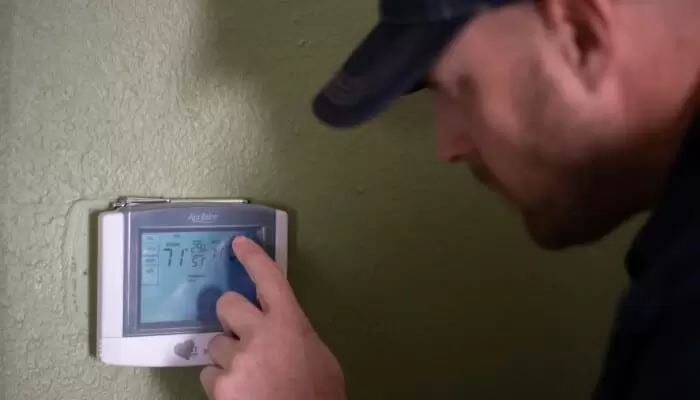Heating & Cooling Tune-Up Services To Keep Your Lubbock, TX Home's HVAC Humming Along
A heating and cooling tune-up is a great way to keep your HVAC system operating as it should. HVAC tune-ups ensure that your heating and cooling system is clear of any dirt that could obstruct or overly tax your HVAC unit. When your HVAC system is maintained on a regular basis, it will last longer and you will spend less on heating and cooling repair costs. Make sure you track the pulse of your heating and cooling system with our thorough and effective heating and cooling tune-up services. To schedule your HVAC tune-up, give us a call at 806.795.1207 today!

HVAC Tune-up FAQs
Preventative HVAC maintenance typically involves tasks like cleaning and replacing air filters, lubricating moving parts, inspecting and cleaning coils, testing safety controls, examining electrical components, and scrutinizing the blower assembly. The program also encompasses ductwork inspections, checks for refrigerant levels, and assessments of the system's overall operation. These measures aim to detect and address potential issues before they escalate, ensuring optimal performance and preventing unexpected breakdowns in the HVAC system. Regular professional checkups contribute to the durability and reliability of HVAC systems, maintaining their efficiency through routine evaluations by experts.
Differentiating between HVAC system repair needs and routine maintenance involves several indicators. Look for irregularities like unusual noises, reduced airflow, or inconsistent heating/cooling. Visible leaks, unusual odors, or frequent cycling can signal potential problems requiring repair. Conversely, routine maintenance involves scheduled tasks like filter replacement, coil cleaning, and system inspections aimed at preventing issues and optimizing performance. If unsure, consult HVAC professionals to diagnose and address specific concerns promptly, ensuring efficient system operation.
Yes, an HVAC tune-up can reduce your energy bills. By ensuring your air conditioning system operates at peak efficiency, a tune-up can lower energy consumption. During a tune-up, technicians clean components, check for proper refrigerant levels, and ensure the system is running smoothly. This reduces the strain on the unit, leading to less energy usage to maintain cool temperatures. Regular tune-ups prevent minor issues from becoming major problems, further contributing to energy savings by avoiding inefficiencies in the system's operation.
What Are Some Signs Your HVAC System Needs A Tune-Up?
Some hints your HVAC unit might be in need of a tune-up include:
- Your energy bills are increasing for no good reason.
- There is little air flow coming from your vents.
- Your rooms aren't being heated or cooled evenly.
Getting your HVAC tuned up can help you identify repair needs before they become large, costly repairs.
How Often Should You Have Your HVAC Tuned Up?
To get the best results from having your HVAC unit tuned up, you should get it tuned up at least twice a year. Having your heating and cooling system serviced twice a year, once in the spring and once in the fall is very beneficial. Bi-annual maintenance allows for your system to be cleaned and fixed to prepare for the heating and cooling seasons.
What Are The Benefits Of Heating & Cooling System Tune-Ups?
There are many benefits to HVAC tune-ups including:
- It reduces heating and cooling costs.
- It ensures proper and safe HVAC operation.
- It improves your equipment's efficiency.
- It adds years to your HVAC system's life.
Another benefit to getting your HVAC tuned up is that you are able to detect small issues early before they turn into costly repairs.
How Often Should You Replace Your Air Filters?
As a general rule, it is recommended that you replace your HVAC system’s air filter at least once every three months. Replacing your HVAC system’s air filter frequently will help promote better airflow to your unit, reduce the frequency of HVAC system failure and contribute to better heating and cooling. If you have multiple family members in your household or you have pets, you should replace your air filter once every one to two months.
What Does An HVAC Tune-Up Typically Include?
A standard HVAC tune-up usually includes the following:
- An adjustment of the burners, bypass dampers, operating pressures and thermostat
- Cleaning of the blower wheel, burners, combustion chamber, condenser coil, evaporator drain and filters
- A check of the combustion air, evaporator coil, fan blades for tightness, flame baffle, flue, heat exchanger and capacitors
- An evaluation of the safety controls, vent system and valves
- Lubrication of the fan motor and other moving components
- A test of the fan limit switch, thermocouple and electrical connections
If you have any questions about HVAC tune-ups or are thinking about getting your heating and cooling system tuned up, send us a message online or call 806.795.1207 today!



